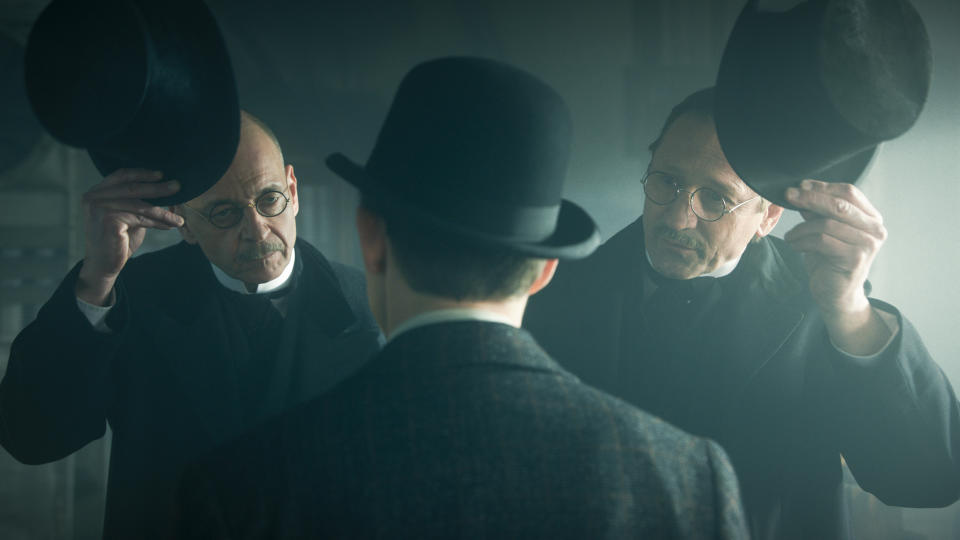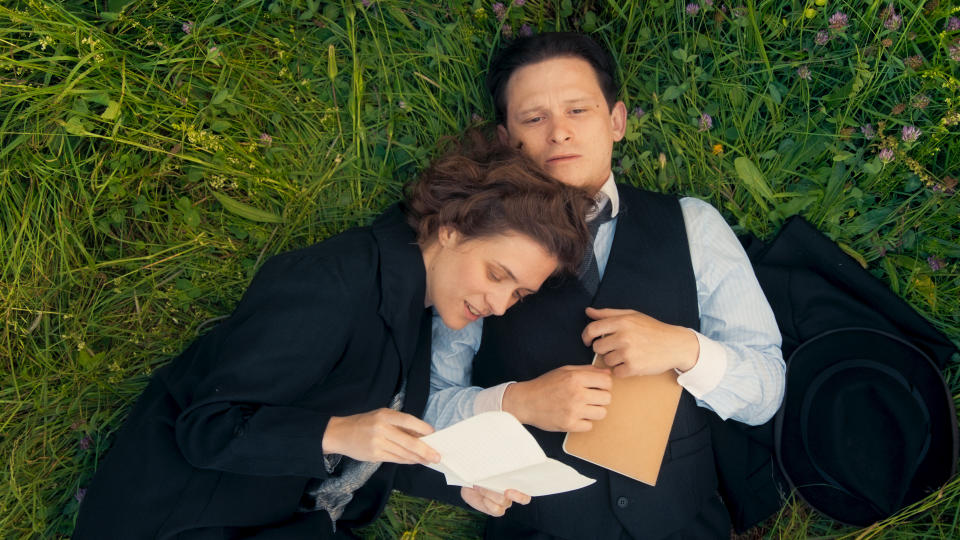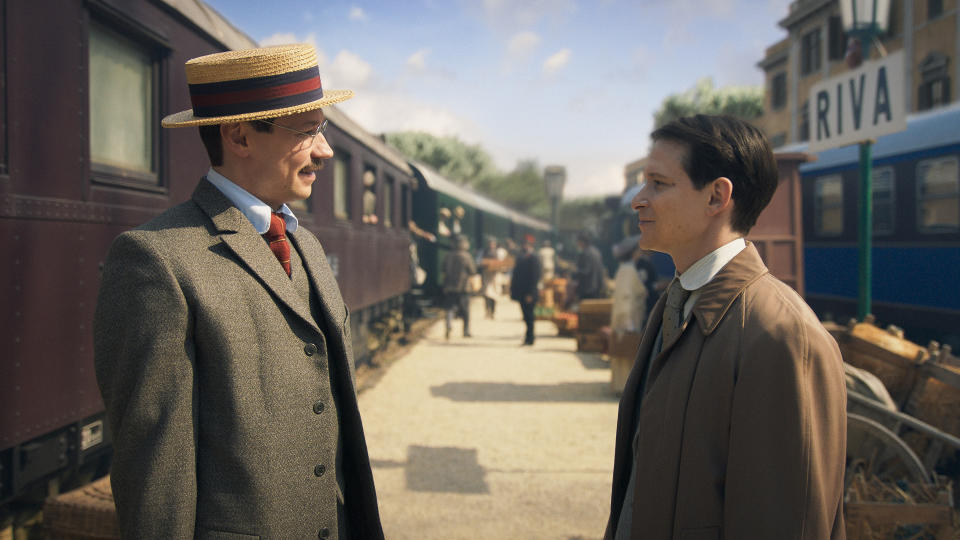Finding ‘Kafka’: A New German Series Explores the Man Behind ‘The Metamorphosis’

100 years after the death of Franz Kafka, a new mini-series aims to dive beneath the surface of an author who remains enigmatic even as his influence on the culture continues to grow.
Kafka, an ambitious German-language meta-drama written by Austrian writer/director David Schalko (Braunschlag) and best-selling author David Kehlmann (Measuring the World), is based on Reiner Stach’s exhaustive three-volume biography of Kafka and weaves together the writer’s life and work, finding the connections and gaps between the two.
More from The Hollywood Reporter
Schalko, who spent more than a decade developing the series, and directs all six episodes, says he was well aware of the perils of trying to capture Kafka on screen. “Everything we think we know about Kafka has become a cliche,” says Schalko.

There is a temptation to depict Franz Kafka, the writer, as a “Kafkaesque” character, and his work as simply a heightened reflection of his life. On the surface, Franz Kafka appears to be almost nakedly autobiographical. One could draw a straight line between Josef K.’s struggles in The Trial — as a man arrested for an unknown crime and condemned to death, who finds himself trapped in a labyrinth of official red tape, unable to find help or humanity — and Kafka’s day job as a clerk inside the byzantine bureaucracy of the Workers’ Accident Insurance Institute in Prague.
Kafka’s letter to his father — 103 handwritten pages that were never delivered — is an excoriating excavation of his relationship with Hermann, his strict and domineering father, and of his suffocating home life among his bourgeois and secular Jewish family.
However, this approach is problematic on several levels. Dramatically, because, as the late Roger Ebert noted, in a negative review of Steven Soderbergh’s Kafka (1992), Kafkaesque stories, which take place mainly “in the minds of reclusive, self-despising men who think mostly about themselves” are notoriously difficult to film. But also because a Kafkaesque reading of Kafka, the man, does not chime with the historical record. The image of the alienated outsider artist ignores Kafka’s wide social circle of friends, family, and literary peers. This supposedly sexually repressed loner had numerous, well-documented romantic affairs. Kafka might have found his work at the Accident Insurance Institute boring and oppressive, but he was very good at it. His bosses promoted him several times, and his colleagues were fans of his writing, attending readings and encouraging him to keep at it.
Instead of attempting to interpret Kafka’s life through his work, the series Kafka reverses the process, taking the known facts of the writer’s life, and reimposing them on the fictional stories. Virtually every scene, and every line Kakfa speaks in the series, is taken directly from from Kafka’s letters or from Stach’s biography. But Schalko interweaves the facts with the fiction, seamlessly segueing from the life more ordinary — a scene of a family dinner or literary reading, or a night at the pub — to graphic dramatizations of Kafka’s works, with all their surreal horror. A man transformed into a bug in “Metamorphosis”. The condemned prisoner of “In the Penal Colony” who has his sentence carved into his skin by an elaborate torture tattooing device, leading him to slowly bleed to death.

The series ditches the cradle-to-grave biopic approach for a more fragmented, non-chronological take. Each episode, or “chapter” is structured like a Kafka short story and tells a section of the writer’s life from the outside, from the perspective of those who knew him best, or at least thought they did. So we get Kafka as seen by his close friend and literary executor Max Brod, who famously defied his friend’s dying wish that he burn all his unpublished manuscripts. Kafka from the angle of his family in Prague. Separate chapters filter Kafka as seen by Felice Bauer, Milena Jesenská and Dora Diamant, the three most important romantic relationships in his life. In a chapter called “The Bureau,” the Kafka story is framed from inside his day job at the Institute and shows the bureaucracy as less oppressive than helpful, when, at the height of the First World War, his bosses intervene to save Kafka’s life by having him officially declared indispensable to the company, preventing him from foolishly enlisting and heading to the front.
“First and foremost we wanted to break with the clichés,” says Joel Basman, who plays Franz Kafka in the series. The supposedly gloomy and despressive writer “got up and went to work every day and didn’t miss a day,” notes Basman. “That is a long way from depression.”
The multiple angles approach also breaks with the idea that there is a definitive way to see Kafka or to interpret his works. Even the narrator, voiced by Michael Maertens, repeatedly stops the story, correcting what he has just said. “Maybe one has to start from a completely different place…”
“We would never have presumed to tell the story from Kafka’s perspective, to tell a classic biopic,” says Schalko. “All we really know of Kafka we know from the outside, from how other people saw him and how other people see his stories.”
For the supporting roles, for Schalko and Kehlmann have assembled a who’s who of German-speaking acting talent. David Kross (The Reader, War Horse) is Max Brod. Babylon Berlin‘s Liv Lisa Fries is Milena Jesenská. Austrian star Nicholas Ofczarek (Braunschlag, Pagen’s Peak) is father Hermann. Lars Eidinger (Dying, Personal Shopper) turns up for a single scene as Austrian poet, and Kafka fan, Rainer Maria Rilke.

“It was like being at a train station, I was standing on the platform watching as the actors just came and went, came and went,” jokes Basman. “I had 72 days on set. David Cross had the next biggest role and that was 22 days. Eidinger did 3 days and then he was gone.”
Each new chapter puts a different spin on Kafka’s life and opens up a different take on his work. The subject Franz Kafka, however, remains a mystery. Basman is mercurial in the role. At times his Kafka is a bemused oddball as he swings through his morning calisthenics, and “Fletcherizes” his food by chewing every bite 40 times, as prescribed by Horace Fletcher, a health-food quack of the era. He can be anxious and awkward. But also incredibly kind and surprisingly funny, ever ready with a quippy comeback or bon mot.
“Unlike the image we have of him, the Franz I found in the research was a very, warm person, a philanthropist, an incredibly attentive, humorous, and sensitive person,” says Basman. “Someone who was highly intelligent but who knew very well how to put up facades, when and where to allow himself to express emotions.”
The actor, who has Swiss and Israeli-Jewish heritage, said it was “oddly comforting” to play Kafka after so many roles as Nazis in films like Land of Mine or series like Generation War.
“I was grateful with Kafka to come home at night and not think: ‘Tomorrow I’ve got to put on a swastika and yell Heil Hitler.’ Also, this is a historic Jewish character whose story doesn’t end in a concentration camp. There are no Nazis. Even if it’s sad that he dies so young, Kafka’s is actually a beautiful story that is significant and important to tell but that won’t leave you with post-traumatic stress syndrome.”
The series arrives with the highest of praise. Salman Rushdie called Kafka “the best dramatization of the life of the great Kafka that it’s possible to imagine…does a great service to one of the true giants of 20th-century literature.” And Ian McEwan, whose 2019 novella The Cockroach is a modern-day update on The Metamorphosis set in the Brexit era, called the series “simply brilliant…The writing flows like honey. Gorgeous, mesmerizing scenes throughout and, at the end, a heart-rending theatrical climax which leaves the viewer deeply moved by the strange and beautiful echoes of Kehlmann and Schalko’s triumphant collaboration.”
Produced by Austrian’s Superfilm for German and Austrian public broadcasters ARD and ORF, Kafka premiered in Europe in March and recently went out on Channel 4’s Walter Presents in the U.K. It hits U.S. screens on Thursday, June 6, timed to the centenary of Kakfa’s death, streaming on the Jewish/Israeli specialist platform ChaiFlicks.
Best of The Hollywood Reporter

 Yahoo News
Yahoo News 
